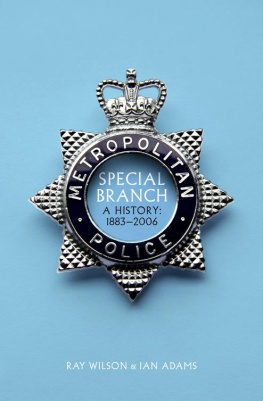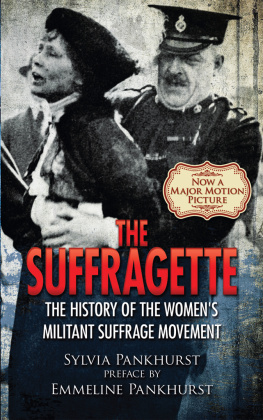I AM DEEPLY INDEBTED to my friend and former colleague, the late Ian Adams, who permitted me to share in his authorship of this history. He sadly died when the book was only half completed but he had so successfully infected me with his enthusiasm for researching and recording police, and more particularly Special Branch, history that I was able to finish a task which, until his untimely death, had been a most agreeable experience.
I am also profoundly grateful to two of my tutors at Birkbeck, University of London: to the late Professor Sally Ledger for encouraging me to appreciate the written word and to Mari Alderman for unravelling the mysteries of research. Thanks are also due to Biteback Publishing, and particularly their editor-at-large, Michael Smith, and assistant editor, Victoria Godden, for making publication a comparatively trouble-free process.
In the absence of any access to police records it would have been impossible to produce a meaningful history of the Branch without the many recollections of former colleagues readily supplied. Particularly helpful contributions were supplied by Lord Peter Imbert. Ben Gunn, David Waghorn, Peter Westcott, Dewi Jones, Matt Dwyer, Dave Yeadell, Geoff Craft, Steve Cracknell, Gerrard Hancock, Jim Dale, Colin Colson, Peter Smither, Peter Gardner, Malcolm MacLeod, Don Buchanan, John Howley, David Bicknell,Tony Greenslade, Paul Croydon, Kevin Kindleysides and John Hague and there were others. If I have overlooked some names, I apologise, attributing my oversight to lack of secretarial support and rapidly failing memory!
Finally I should like to thank the staff at the National Archives and the British Library for their unfailing and cheerful assistance and patience.
I N THIS HISTORY of the Special Branch of the Metropolitan Police, Ray Wilson and the late Ian Adams have successfully produced, in a meticulously researched work, the first complete account of the formation, development and eventual demise of this unique branch of the Criminal Investigation Department. They illustrate how the bombings and other violent activities of a small group of terrorists, in an effort to change the political course and direction of a democratically elected government, brought about an extension of the Metropolitan Police remit to cover what we might describe as political crimes.
The writers correct the misconception that in its earliest days the sole purpose of the Special Irish Branch was to contain and bring to justice the Fenians and other politically extreme Irish groups. As the reader will discover, it was also tasked with the requirement to pass information to the government of the day about the activities of the many home-grown and foreign anarchist groups; the dubious activities of the Russian secret police directed against their own targets in London; and even the intentions and activities of the womens suffrage movement, the very nature and being of which became a huge embarrassment and threat to the government as its members adopted increasingly violent tactics.
This extensive and thoughtful story of the formation and development of the Special Branch of the Metropolitan Police will stand as a reference book, not just on its birth, life and amalgamation into the Counter-Terrorism Command of the Metropolitan Police Service, but will, without giving away any vital state secrets, add authenticity and detail to any account of the development of this countrys security services. I recommend the book, not only to those with any connection to or who work within the security arena, but also to the wider public who have an interest in the defence of this countrys interests. There is much knowledge to be gained from this excellent study.
Lord Peter Imbert CVO QPM DL
Commissioner of the Metropolitan Police 198793
| 1883 | Adolphus (Dolly) Williamson |
| 1887 | John Littlechild |
| 1893 | William Melville |
| 1903 | Patrick Quinn |
| 1918 | James McBrien |
| 1929 | Edward Parker |
| 1936 | Albert Canning |
| 1946 | Leonard Burt |
| 1958 | Evan Jones |
| 1966 | Ferguson (Fergie) Smith |
| 1972 | Victor Gilbert |
| 1977 | Robert Bryan |
| 1981 | Colin Hewett |
| 1986 | Simon Crawshaw |
| 1987 | Peter Phelan |
| 1991 | John Howley |
| 1996 | Barry Moss |
| 1999 | Roger Pearse |
| 2003 | Janet Williams |
O N 2 OCTOBER 2006 , the Special Branch of the Metropolitan Police (MPSB) ceased to exist when, as part of a larger operation designed to modernise the Metropolitan Police and improve its efficiency, the Branch which in 1986 had been renamed Special Operations 12 (SO12) was merged with another unit, the Anti-Terrorist Branch (SO13), to become SO15. The move was greeted with dismay by past and present members of the redundant department, who were proud of its fine traditions and felt that the knowledge and expertise that had been accumulated and honed for well over a century were to be diluted and allowed to disappear into thin air.
While numerous books published over the years describe particular aspects of Special Branch work, there is no comprehensive history covering the whole of its lifespan, not least because the confidential nature of its work has inhibited the disclosure of some of its more interesting, but covert, operations. However, in recent years, and particularly since the passing of the Freedom of Information Act in 2000, there has been a growing tendency for some security and other official organisations to be more forthcoming about their evolution, past In contrast, the greater part of Special Branch archives has remained closed, and much of its past and recent activity has continued to be unnecessarily shrouded in mystery.
There are of course valid reasons why certain matters should remain secret, and while each has to be judged on its merit, they can be summarised as those disclosures which might:
(a) prejudice ongoing enquiries;
(b) prejudice human or technological sources;
(c) damage the United Kingdom or its relations with another country; or
(d) be not financially viable due to lack of resources or manpower.
Most government papers on which a time restriction has been imposed are available after thirty, seventy or 100 years. The Metropolitan Police has resisted disclosing many documents even after the expiry of such periods and this has made the task of historians more difficult. The primary sources cited in this book are all within the public domain; they include the few Special Branch reports that have been released, contemporary news reports and documents sent by the Branch to the Security and Intelligence Services, the Cabinet Office, the Home Office and the Foreign Office, and subsequently released by them. Together they show the substantial contribution to the security of the state made by the Special Branch during its lifetime. We have also drawn on a number of interesting articles by writers on the internet and, inevitably, on the recollections of former members of the MPSB. No single book could adequately cover the vast number of cases with which the Branch was involved, but we hope that the examples we have been able to give will illustrate how the Branch helped to enable the government to distinguish between those who sought to destroy the state and those who merely wished to express a different political view about how it should be governed.
In the early part of the book, we follow the fortunes of this unique part of the Criminal Investigation Department (CID) from its inauspicious birth in Queen Victorias reign, describing the ever-widening range of its responsibilities and activities during the challenging times of the late nineteenth and twentieth centuries, and concluding in the later chapters with its loss of identity and eventual demise in the massive reorganisation of the Metropolitan Police to cope with a new type of terrorist threat at the beginning of the twenty-first century.







